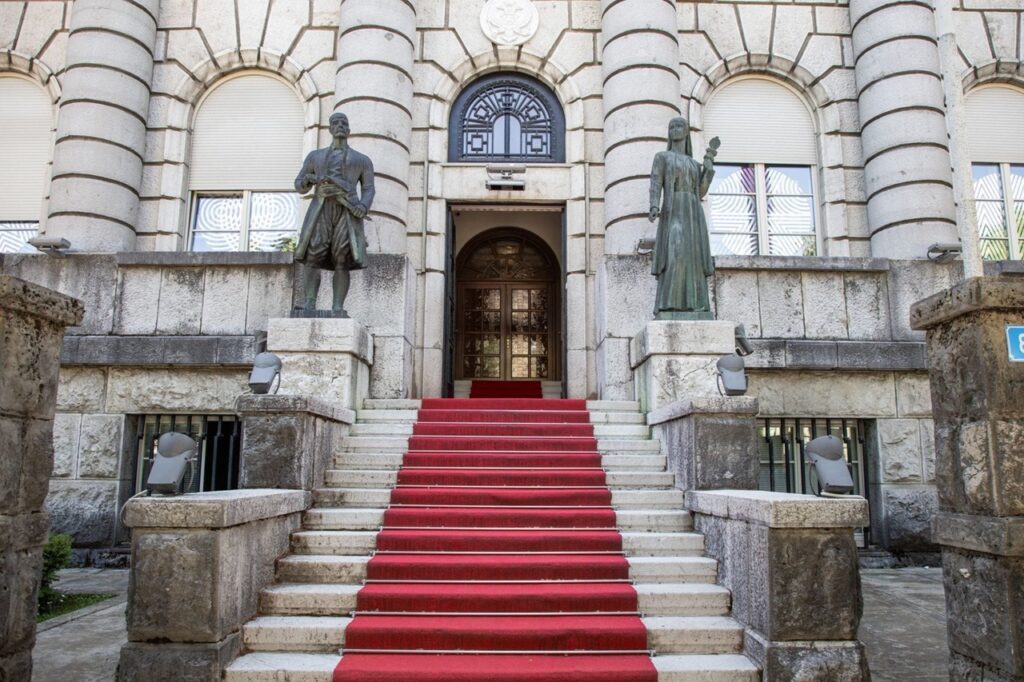Human Rights Action (HRA) and Centre for Civic Education (CCE) point out that officials in the municipality of Pljevlja continuously violate the Law on Memorials, by not seeking the Ministry of Culture and Media’s approval for street renaming.
CCE and HRA remind that the municipality of Pljevlja recently renamed several streets, including Tivatska Street, which was named after JNA soldier Branko Krvavac, as well as a part of King Peter I Street, between Omladinska and Velimir Jakić streets, which was named after Yugoslav Army soldier Vukoman Tešović, without obtaining prior approval from the Ministry of Culture and Media, this breaching the law.

According to the Ministry of Culture and Media’s decision no. UPI 13-037/24-160/2 dated 8 May 2024, which we obtained under the right to access information, the president of the Pljevlja municipality did not submit a request for approval of the Draft Programme containing street names, i.e. did not initiate the legally prescribed procedure. These streets were renamed unlawfully, solely based on a decision made in the local parliament.
According to Article 2 of the Law on Memorials, in addition to monuments, memorials also include the names of public institutions, public enterprises, settlements, and public facilities (streets, squares, roads, parks, fountains, etc.). For any naming, renaming, and erection of memorials, the consent of the Ministry of Culture and Media is required (specifically, the Ministry approves the Draft Programme for Erecting Memorials, which should include according to Article 8 of the Law: significant events, prominent individuals, cultural-historical traditions, freedom fighters, civil war victims, and mass human casualties for which the memorial will be erected, with an explanation of the reasons for erecting memorial; type of memorial, method of erection, and description of the symbolic meaning; list of memorials to be altered, revised, relocated, replaced, or removed).
It is clear that the aforementioned streets in Pljevlja were unlawfully renamed because it was done without the prior approval of the competent authority, indicating abuse of official position. The actions of the Secretary for Culture, Social, and Other Issues of the municipality of Pljevlja, Sanja Đondović, the President of the Pljevlja Municipal Assembly, Jovana Tošić, and the President of the municipality of Pljevlja, Dario Vraneš, may lead to the determination of criminal responsibility under Article 411a of the Criminal Code of Montenegro (Violation and Unlawful Erection of Memorials). It is also unclear why such gross and continuous breaches of the law are allowed by political parties, whether they are in power or opposition.
We also remind that NGOs HRA, CCE, and ANIMA previously expressed strong protest against the renaming of Tivatska Street to Branko Krvavac Street due to its illegal process and as an example of negative historical revisionism. Additionally, this issue has brought negative regional attention and criticism from neighbours, reported by Croatian media.
Furthermore, on 11 June 2024, the members of the Pljevlja Municipal Assembly adopted a decision to rename the current Drvarska Street, from Zlatiborska to Lovćenska, to Captain Đurko Bojović Street, a captain of the Yugoslav Army.
CCE and HRA urge the Ministry of Culture and Media to proactively investigate this decision, as well as all other street renamings in Pljevlja in recent years, and to undertake supervisory measures to curb illegal actions and mitigate their negative consequences.
It is important to emphasize that Branko Krvavac, Vukoman Tešić, and Đurko Bojović do not meet any legally prescribed criteria for being considered as “prominent individuals.” According to Article 5 of the Law on Memorials, a prominent individual is one who: 1) has made a significant contribution to the state, social, economic, scientific, or cultural development of Montenegro or a specific area, i.e., place in Montenegro; 2) whose work has international historical, scientific, cultural, humanitarian, or sports significance; 3) was an organizer or prominent participant in the liberation war, uprising, or movement; 4) stood out in the fight against fascism.
CCE and HRA call on the local government of Pljevlja to consistently and transparently apply legal regulations without favouring particular political interests. We particularly demand that the Ministry of Culture and Media stop the irresponsible renaming of streets by local officials, in the general interest of achieving the rule of law as a key condition for Montenegro’s accession to the European Union.
Tea Gorjanc Prelević, Human Rights Action (HRA)
Daliborka Uljarević, Centre for Civic Education (CCE)
